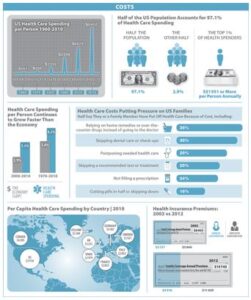

You are probably well aware by now that the federal government has shut down temporarily. This is largely over the Patient Protection and Affordable Care Act, sometimes called Obamacare. Congress already passed this law in 2010, which has been going into affect in stages.
However, last Sunday night, Congress could not overcome political and financial differences on passing a continuing resolution that would authorize federal spending on the last part of the fiscal year. Some argue that opponents of the Affordable Care Act refused to allow this spending in order to weaken the start of President Obama’s health care reform efforts. While our leaders try to compromise on a solution, let’s explore what you (or your parents) need to know about the health care reforms that are part of the shutdown.
When lawmakers proposed Obamacare they had two major goals: making it easier for the roughly 60 million people without health insurance to get it, and making health insurance better for those who already do. This means new rules for both insurance companies and for Americans. There are many reasons why people aren’t insured. First, it can be very expensive. Second, insurance companies were allowed to deny coverage to people who had certain illnesses or conditions. The new law will address both of these issues.
To help you better understand the details of the new health care law, check out this YouTube video from the channel The Healthcare Triage.
What Will NOT Change
- Younger people with disabilities and those over 65 who have Medicare (a medical insurance program for the elderly funded by the federal government) will see no change in their current coverage.
- Those who have insurance through their jobs or an individual policy with an insurance company will probably see little change. Their policies might even get better depending on the insurance company.
What WILL Change
- Everyone will have to be insured by mid-2014. The government has set up an online store called an “exchange.” There will be differing levels of coverage grouped into four basic levels – Bronze, Silver, Gold and Platinum. The higher the cost, the better the coverage. Citizens can begin investigating different options this month. The policies are due to go into effect on January 1, 2014.
- Some people who cannot afford insurance may qualify to receive health insurance through a “subsidy” (money paid by the government) in the form of a tax credit.
- Those who fail to obtain insurance will have to pay a penalty.
- Medicaid (a federally-funded insurance program for the poor) will be expanded.
- Adults can stay on their parents’ insurance plan until they are 26.
- Preventative services (like yearly check-ups, screenings, maternity care and some mental health care) will be free.
- Employers with more than 50 people will have to provide insurance to its full-time employees. These employers will also have to show the amount they pay for employee’s insurance on each paycheck.
- There will be no limits on how much your insurance will be each year of during a person’s lifetime.
So What’s the Problem?
The Affordable Care Act is a huge undertaking, made up of hundreds of “provisions” (or rules). Politicians are widely divided on this issue. Those opposed to the law believe it will cost taxpayers too much and will negatively impact an individual’s quality of care.
Supporters of the law believe it is an important step toward slowing the rising costs of American health care.

The biggest problem currently is a divided Congress. The Republican majority in the House of Representatives and the Democratic majority in the Senate cannot come to any sort of compromise. The House, for example, voted 40 times to “repeal” (or overturn) Obamacare, but all of those efforts were blocked by the Senate. Just before the shutdown, the House of Representatives voted on a compromise bill, one that would delay Obamacare and raise the debt ceiling for one year. The Senate voted against it, so it failed.
